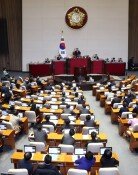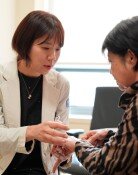China takes away key talent from Korea
China takes away key talent from Korea
Posted September. 30, 2024 08:22,
Updated September. 30, 2024 08:22
It has been confirmed for the first time that at least 13 Korean experts had been recruited to China through the Thousand Talents Plan, China’s overseas science and technology talent recruitment program. They were all key talents who had shown outstanding research results in national strategic technologies such as new materials, biotechnology, and artificial intelligence (AI). Some scholars received presidential awards, and others were included in the “Top 100 Scientists in the World.” Though the Thousand Talents Plan has officially ended, China’s efforts to steal Korean talents continued persistently.
When The Dong-A Ilbo team tracked down Korean scholars who participated in the Thousand Talents Plan, it was found that China had approached talented individuals through all means if they had the necessary skills. They mainly recruited them through Chinese professors whom the Korean scholars had connections with or Chinese students whom they taught in Korea. What attracted the scholars was not money that guaranteed their retirement, but a supportive research environment. They focused on recruiting scholars who wanted to continue their research after retirement and wanted to research without research fund concerns.
The ‘Thousand Talents Plan’ was officially terminated due to opposition from countries on talent drain, but it is still confidentially being carried out under names such as the ‘Qiming (meaning enlightenment) Plan.’ Prospective candidates are sought through professional job search platforms, those who have expressed to research core technologies such as next-generation semiconductors. Reportedly, the support amounts to 2.4 billion won per person per year, including subsidies, salaries, and research funds.
Not only talents but also core technologies were leaked. A pharmaceutical expert selected for the Thousand Talents Plan revealed that s/he was required to hand over research-related patents to China as a condition of support. A KAIST professor who was sentenced to two years in prison by the Supreme Court in May of this year was confirmed to have handed over 72 core technologies, including lidar, which is called the eyes of self-driving cars, to China while participating in the Thousand Talents Plan for two years.
With the Chinese focused on R&D and talent acquisition at the national level, Korea’s technological competitiveness in eleven key national science and technology areas has been overtaken by China for the first time in 2022. Korea still fails to both nurture and maintain the talent that is the core of the era of technological hegemony. Talent that should be brought into science and engineering are being taken away by medical schools, with developed talent leaving the country. Universities are finding it difficult to acquire proper research equipment and recruit professors to teach students. Despite the situation, the government continues to push forward with empty slogans for talent acquisition measures such as “attracting 1,000 top-level overseas talents.”







